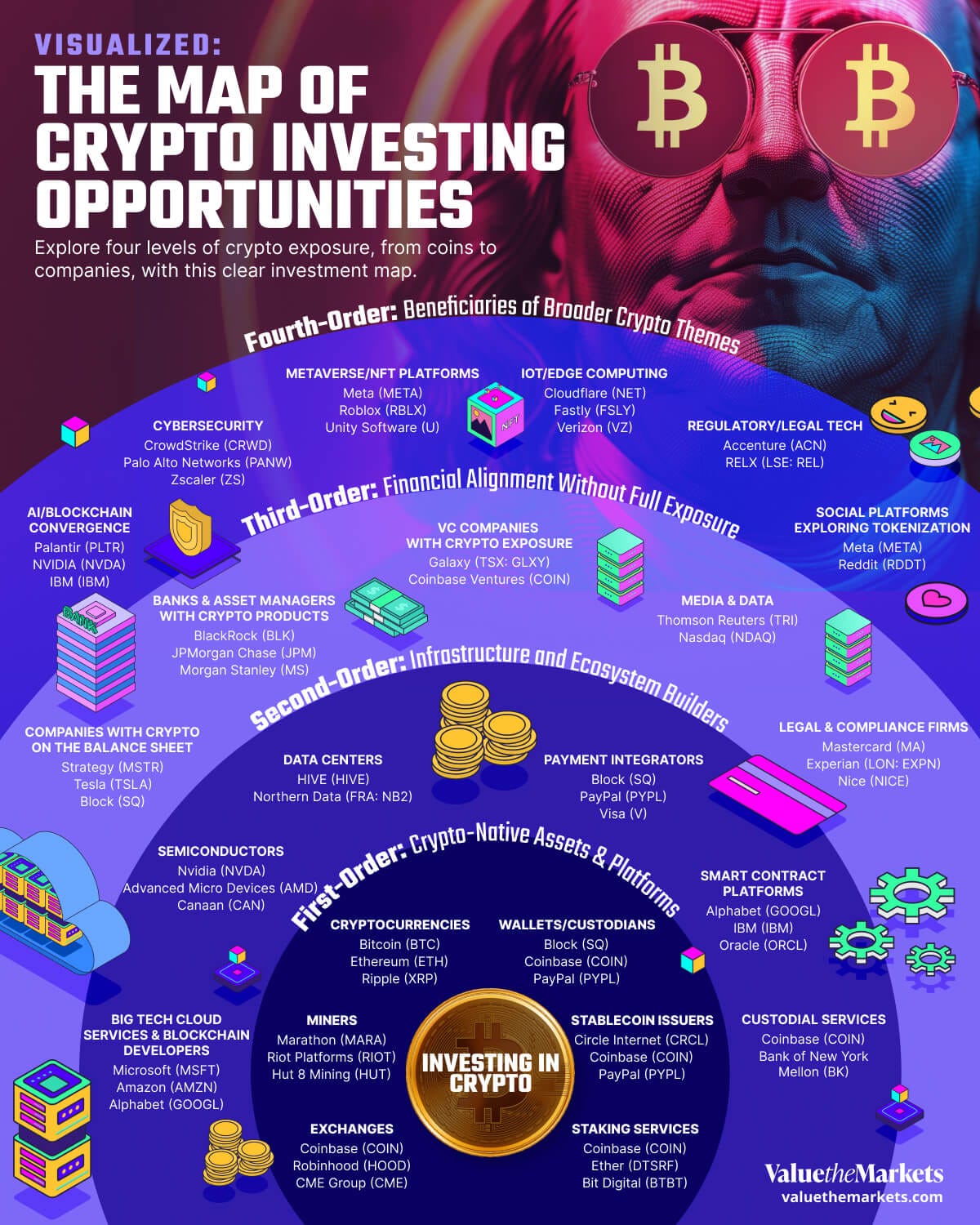🔢 The Four Layers of Crypto Investing Explained 🤑
Explore four types of crypto investments, from coins to AI-driven firms. Find out what fits your risk level and how to build smarter exposure.
Check out our Investing Data Story: 4 Layers of Crypto Investing Opportunities
Understanding the Four Orders of Crypto Investing
When most people hear “crypto investing,” they think of Bitcoin, Ethereum, or maybe exchanges like Coinbase. But the crypto universe is more layered than that. To make smarter decisions, retail investors should consider the entire spectrum of digital asset exposure. This includes everything from direct plays like coins and miners to tech infrastructure, strategic financial participants, and even companies that benefit from crypto without being in the space directly.
This four-part model helps you think strategically about where to invest based on risk, exposure, and your own conviction in crypto’s long-term impact.
Why Crypto Investing Is Important for Retail Investors
Crypto is moving into mainstream portfolios with institutional support and regulated ETFs now in the mix.
Not every crypto-related company relies on coin prices, offering exposure that isn’t just speculative.
Infrastructure players often profit during both bull and bear markets, adding stability.
Crypto technology is influencing AI, payments, and cybersecurity, expanding the investment map.
Investors can scale exposure to match their risk level, from high-volatility coins to stable service providers.
First-Order: High-Risk, High-Reward Direct Plays
First-order exposure is the most direct and volatile. It includes:
Coins like Bitcoin and Ethereum that trade on public blockchains.
Exchanges like Coinbase or Robinhood, which profit from trading volumes.
Miners such as Marathon Digital or Riot Platforms that earn rewards by validating transactions.
Wallet providers and custodians like Block and PayPal that store digital assets.
Stablecoin issuers like Circle and Tether that peg assets to fiat.
Staking services offering rewards to those who lock their crypto to support blockchain operations.
If you’re investing here, you’re betting directly on adoption and price. These assets swing wildly, which can be profitable—or painful.
Second-Order: Infrastructure and Ecosystem Builders
Second-order companies profit from the expansion of the crypto economy, not just price moves. They include:
Cloud and blockchain developers like Microsoft and Google that support decentralized apps.
Semiconductor firms like Nvidia and AMD powering mining and AI systems.
Data center operators such as HIVE Digital and CoreWeave who handle processing power.
Payment companies like Visa and PayPal are integrating blockchain into their networks.
Smart contract enablers like Oracle and Chainlink.
Institutional custodians such as Bank of New York Mellon offer asset security.
These companies provide more balanced exposure. They’re less volatile than coins but still poised to benefit from broader adoption.
Third-Order: Financial Alignment Without Full Exposure
These firms are financially involved in crypto but not crypto-first:
Public companies holding crypto, like Strategy and Tesla.
Banks and asset managers such as BlackRock and JPMorgan launching ETFs or crypto funds.
Venture capital firms like Andreessen Horowitz and Galaxy Digital backing startups.
Media, legal, and data platforms supporting the space’s growth, like Nasdaq and Chainalysis.
Investing here connects you to crypto without the full swings of the market. These firms hedge their exposure, blending crypto with traditional operations.
Fourth-Order: Beneficiaries of Broader Crypto Themes
Crypto’s themes, decentralization, tokenization, digital identity, are spreading to other sectors:
AI companies like Palantir and Nvidia exploring blockchain applications.
Cybersecurity providers such as CrowdStrike and Palo Alto Networks securing digital assets.
Metaverse and NFT firms like Meta and Roblox pushing digital ownership.
IoT players like Cloudflare supporting decentralized connectivity.
Social and regulatory tech such as Reddit and Accenture working on token use and compliance.
These firms might never own a coin but still stand to gain if crypto keeps expanding. They’re long-term tailwind plays.
Read 4 Layers of Crypto Investing for more information.

